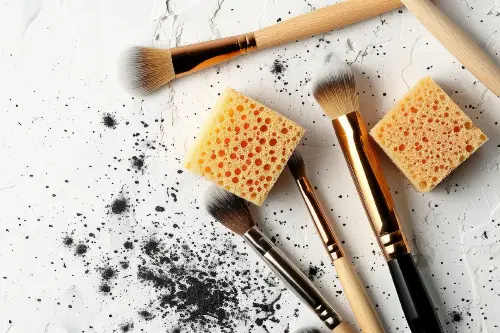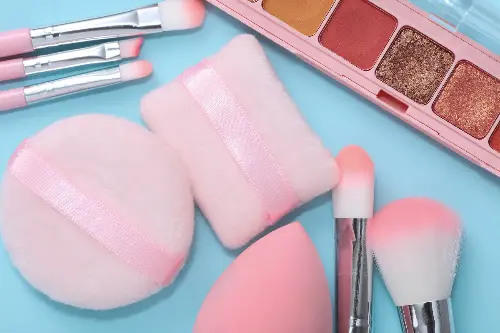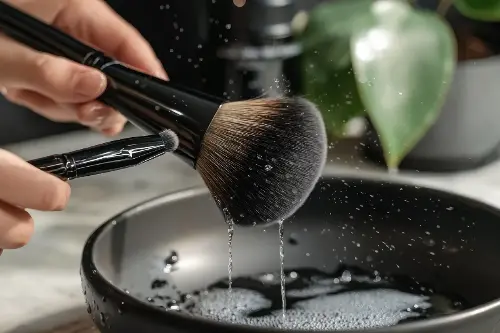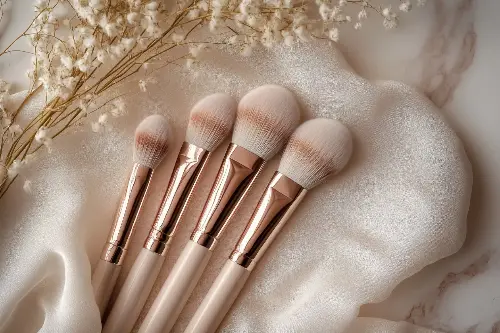Amidst the daily hustle and the quest for a flawless makeup application, an often-overlooked aspect of our beauty regimen lurk silently, teeming with potential perils—the hygiene of our beloved makeup tools. The brushes that contour, the sponges that blend, and even the eyelash curlers that lift may harbour more than just your favourite products; they could be hiding a secret world of microbes that pose risks to your health and skin. Understanding these risks and implementing proper cleaning techniques not only preserves your tools but also protects your skin's beauty and wellness.

The Invisible Threat: What's Lurking on Your Makeup Applicators
Makeup brushes and applicators come into direct contact with our skin, and if not cleaned regularly, can become breeding grounds for bacteria, fungi, and viruses. These microorganisms can lead to a range of skin irritations and infections, from acne breakouts to conjunctivitis and even cold sores. In particularly dire situations, sharing dirty makeup tools can transmit more serious conditions, such as staph infections. Old and unwashed makeup tools also tend to accumulate dead skin cells and oils, which impedes their performance, diminishing the smooth application of products and leading to a patchy or inconsistent finish.
The Science Behind the Grime
Studies have shown that unwashed makeup equipment often contains harmful bacteria such as E. coli, Staphylococcus aureus, and fungus, some of which can be resistant to antibiotics. These findings underscore the importance of maintaining clean makeup applicators to avoid potential health hazards. Furthermore, certain types of makeup, especially liquid-based products, provide a moist environment that microbes favour for growth. These facts create a compelling case for hygienic practices within our beauty routines.
Scrutinising Sponge Safety
Beauty blenders and sponges require special attention as their porous nature is an ideal hiding spot for bacteria. Using dirty sponges can cause the transfer of bacteria back to your makeup products, leading to a vicious cycle of contamination.

Your Routine for Cleanliness
Here lies the good news: Regular cleaning of your beauty tools is a straightforward process that can greatly reduce the risks mentioned. Here are some tips to help you cultivate a hygienic makeup environment:
Routine Cleaning Rituals
Make a habit of cleaning your makeup brushes at least once a week. For sponges that are used daily, it is recommended to clean them after each use due to their increased susceptibility to bacteria buildup.
Method to the Cleanliness
For brushes, use lukewarm water and a gentle shampoo or a specialized brush cleaner. Swirl the bristles in the palm of your hand and rinse till the water runs clear. Avoid getting the handle wet to preserve the glue that holds the bristles. For sponges, use a mild cleanser and squeeze multiple times while submerged in water, as well as rinsing thoroughly.

Natural Cleaning Solutions
If you prefer natural cleaners, a mixture of olive oil and dish soap can efficiently remove residue while conditioning the bristles of brushes.
Let It All Dry Out
Post-wash, lay your brushes flat on a clean towel and reshape the bristles to their original form. Hang sponge applicators in a mesh bag for proper ventilation, as damp environments promote microbial growth.
Regular Replacements Are Paramount
Despite the best cleaning efforts, makeup tools—especially sponges—should be regularly replaced. Makeup experts suggest replacing sponges every three months and brushes once they start to shed or lose their shape.

Sanitising Your Beauty Routine
Beyond washing your applicators, pay attention to the sanitation of other beauty tools such as tweezers, lash curlers, and sharpeners. Wiping them with an alcohol swab after each use can keep them free from potentially harmful bacteria.
Spotless Storage Solutions
Storing your tools in a clean, dry place is vital. Brush holders or rolls are excellent for keeping brushes in shape and clean, while spongers can benefit from breathable pouches or stands that reduce the chance of bacteria growth.
In conclusion, the appeal of a full makeup set and the dazzling array of colours and textures can quickly become overshadowed by the hidden dangers that unclean applicators pose. By elevating the role of hygiene in our beauty regimes, we can ensure that our makeup practices are not only enhancing our external beauty but also safeguarding our skin's health. As valuable as the tools in our makeup bags, a regimen of cleanliness is the true foundation for any beauty endeavour. Remember, your skin deserves the same level of care as the artistry you use to adorn it. Cleanliness isn't just next to godliness when it comes to your makeup applicators—it's at the very heart of beauty itself.
